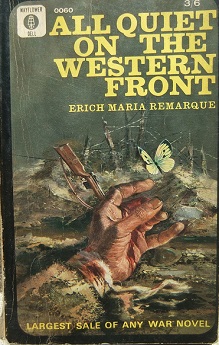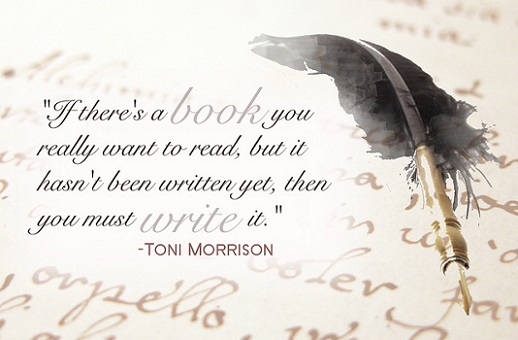 Creative Writing: Combination Notes
Creative Writing: Combination Notes
In these notes, the final in our series of MFA Notes, I’m going to combine any leftover notes that are too short to require completely new blog posts.
Sections covered:
- The Sentimental Trap.
- Subtlety of Transitions.
- Giving Effective Feedback.
- Character Arc: 1st POV.
- Pain for Laughs: Making Characters Comedic and More Complex.
The Sentimental Trap
Sentimental writing tells us what we already know, while writing that is full of sentiment, surprises, shakes us up, and moves us through originality, complexity, and the renewal of perception. It means to be scared, beyond sweaty palms and a racing heart. To be in love, beyond butterflies in the stomach.
Clichés are superficial – the woman biting her nails = she’s nervous. Biting nails is a cliché for conveying nervousness. Go deeper. Beyond, behind, the nail biting.
“Figure out what you really saw and really felt, not what you’re suppose to see or feel.” – Hemmingway
Be precise and specific. Dig deep and avoid clichés.
Main Point:
Sentimentality = Bad.
Sentiment – Good.
Subtlety of Transitions
You can prepare the reader for transitions.
Take risks as a writer. Sometimes A + B does not equal C.
All punctuation is a type of transition.
There are natural transitions in conversation/dialogue. Use those.
Giving Effective Feedback for Creative Writing
Look at the work through different lenses. Both as a reader and a writer.
Sometimes people aren’t ready for certain feedback. Ask yourself what feedback would benefit someone the most?
Make sure you’re aware if you’re looking at a tenth draft or a first draft. If it’s a first draft you’ll know not to bother with certain punctuation and grammer issues, since those shouldn’t have to be worried about until the final draft (it’s pointless to worry about commas and dangling modifiers when the sentences in which they appear will probably differ from draft to draft). And if it’s a final draft that’s when you’ll know to give it a closer line reading and make sure every comma is in its place.
Detail: Positive construction and negative construction they’re only useful if they’re in detail. Can’t just say “I like this,” “I don’t like that.” Detail helps (make as specific as possible).
Writing Prompt:
“He jumped from a cliff into the ocean. His head cracked wide, his blood swept out with the tide. “Rinse a cut with salt water,” his mother always said. But it was too late he floated dead.”
Detach from outcome. Give all you can and then just let go.
Character Arc – 1st POV
Character arc = Transformation.
What happens to a character vs. what goes on inside them.
Feel the character. Their emotional arc. *There should always be a plot arc, but we also need the emotional arc.*
Push the characters to the brink, where they have no choice left but to change.
The moment of truth. The moment of change. THE PUSH.
Pain for Laughs: Making characters comedic and more complex
Dark comedy – flawed people in pain. For a flawed character, sometimes the more pain, the more the obsession, the funnier it becomes
[For a good example watch the movie Dr. Strangelove.]
Uncomfortable → Tension → Release
What is their ruling obsession? Routine can be an obsession. Obsession can be out of character too.
Dark Comedy: Make sure it’s a combination. Don’t let it get too funny, too light, too goofy, you still want to keep that layer of darkness. Conversely, don’t let it get too dark, you need some comedy to lighten the darkness.
*These notes were from a combination of student taught classes at Lesley’s MFA program.*
Click here to see more MFA Notes…
Recommended book for this section: Unless It Moves the Human Heart: The Craft and Art of Writing, by Roger Rosenblatt.
Picture: Flickr/Hannah Conti
About these MFA Notes: Revising your creative writing
—
Recently, I graduated from Lesley University with an MFA in creative writing, and I decided that I wanted to share what I learned in a series of blog posts.
I decided to share for two reasons:
1) My notes, although not too detailed, could possibly help other writers.
2) Rewriting my notes forces me to re-read and re-think everything I learned, so it’s a win-win.
But before we dive in, please keep two things in mind:
1) These notes are neither complete nor perfect. The classes at Lesley were not typical lecture/note classes; the classes were filled with writing and thinking exercises and often this left no time for notes (in a good way). However, even with that, these sparse notes, I do believe, could still offer value.
2) I may, from time to time, include actual writing prompts from the classes, please bare with me, they’re first drafts and were done in the moment.
I hope you enjoy this series of notes and if you have any questions about the notes, Lesley University, or MFA’s, please feel free to contact me.
—
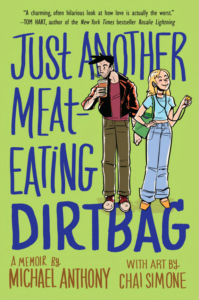


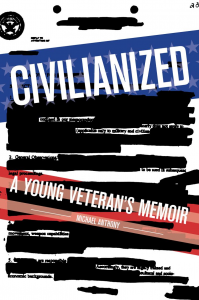
 The show
The show 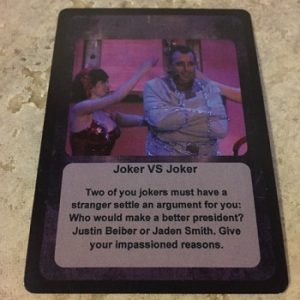
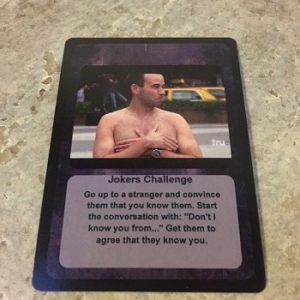
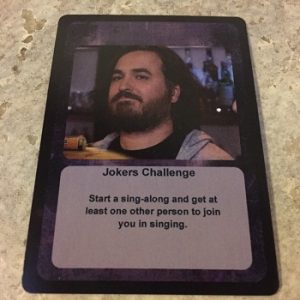
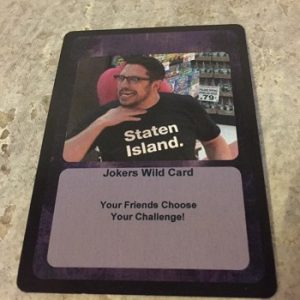 After each participant either completes or fails their challenge, all losers will then draw a punishment card (other option is that you continue with the challenge cards until there is only one loser).
After each participant either completes or fails their challenge, all losers will then draw a punishment card (other option is that you continue with the challenge cards until there is only one loser). The punishment cards also have a different back than the challenge cards (so they can easily be told apart).
The punishment cards also have a different back than the challenge cards (so they can easily be told apart).

